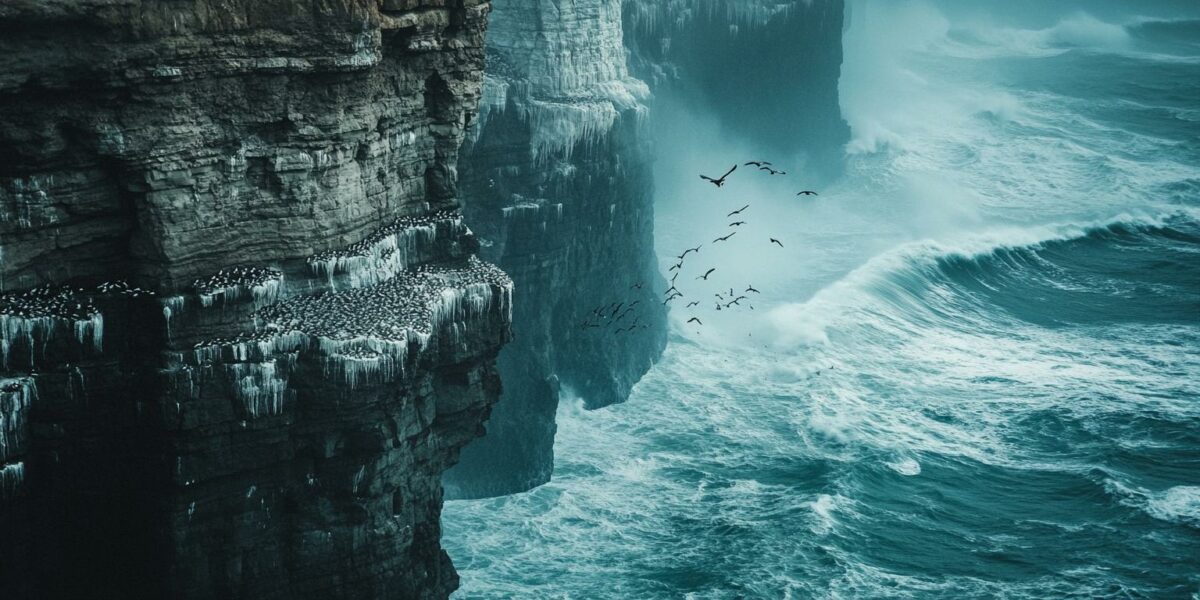Seabirds in Peril
The UK’s seabird populations are facing an unprecedented crisis. Overfishing and climate change are drastically altering their food supply, causing numbers to plummet. These magnificent birds, from auks to puffins, are struggling to survive amid shifting ocean conditions.
Ocean warming is a silent killer, disrupting the life cycles of seabird prey such as sandeels. This scarcity leads to population collapses, compounded by severe weather events like winter storms and summer heatwaves, which also take a toll on seabird numbers.
Beyond climate change, seabirds must contend with entanglement in fishing gear, invasive predators, and collisions with offshore turbines. Each of these threats chips away at their already dwindling populations.
In 2021, the highly pathogenic HPAI H5N1 strain of avian flu struck the UK, leading to the deaths of tens of thousands of seabirds. This virus, which originated in domestic waterfowl in China, has since spread worldwide, hitting seabirds hard and further exacerbating their decline.
Disease and Decline
Seabirds are particularly vulnerable to infectious diseases due to their breeding habits. They typically produce few young and live in dense colonies, making it easy for diseases to spread. The impact on great skuas has been particularly severe, with numbers down over 70% from the last census.
The lifestyle of seabirds makes them prone to disease outbreaks. Living in crowded colonies, they can easily transmit infections, and their low reproductive rate means recovery is slow. Despite their longevity, which allows for continued breeding, the dense living conditions pose a significant risk.
Many seabird species, including terns, gulls, and northern gannets, have been devastated by the bird flu outbreak. The unexpected jump of the virus to seabirds has caused widespread mortality, highlighting their vulnerability.
Key challenges include:
- Overfishing reducing food supply
- Climate change altering ocean conditions
- Invasive species and fishing gear entanglement
Conservation Efforts
However, it’s not all bleak. The UK and Scottish governments have taken steps to close sandeel fisheries in the English North Sea and all Scottish waters from 2024. This move is crucial for seabird species like kittiwakes and puffins that rely on sandeels to feed their chicks.
Initiatives to remove invasive predators from seabird islands are also yielding positive results. On Lundy Island, the eradication of brown and black rats has led to the return of breeding Manx shearwaters and puffins, which had been absent for years.
Marine protected areas, such as Lyme Bay, demonstrate that sustainable fishing and conservation can coexist. Since 2008, trawlers have been excluded from Lyme Bay, allowing local wildlife to recover and thrive.
To further aid seabird recovery, comprehensive national seabird conservation strategies are needed. These should focus on protecting colonies, expanding marine protected areas, promoting nature-friendly marine development, and better managing fisheries to reduce bycatch and ensure sufficient food supply for seabirds.
Our Responsibility
Seabirds hold a special place in the UK’s natural heritage. Visiting a seabird colony offers a chance to witness their remarkable lives and understand the crucial role they play in our ecosystem. These birds are indicators of ocean health, and their protection is paramount.
The challenges they face are immense, but with concerted conservation efforts, there is hope for recovery. The steps taken to ban sandeel fishing and remove invasive predators are positive examples of what can be achieved.
Marine protected areas and sustainable fishing practices are essential for the long-term survival of seabirds. By working together, we can create a safer, healthier environment for these incredible creatures.
Every effort counts in the fight to preserve our seabirds. Their survival is intertwined with the health of our oceans, and protecting them is a responsibility we all share.



leoquasar
Great article! But can you provide more details on the specific conservation strategies that are being implemented?
brooklynwhisperer
Overfishing has been an issue for years. Why haven’t stricter regulations been put in place earlier?
nalacascade
This is so sad to hear. We need more aggressive conservation efforts ASAP!
OreoEnchantress6
How are the governments planning to mitigate the impact of bird flu on seabird populations?
Whiskey
Climate change again… It’s like a broken record. 😒
isaiahnova
Is there any hope for reversing these trends, or is it already too late?
Ariana
Thanks for sharing this report. It’s crucial that we stay informed about these issues.
emilyluminous
Wow, this is devastating! What can we as individuals do to help? 🤔